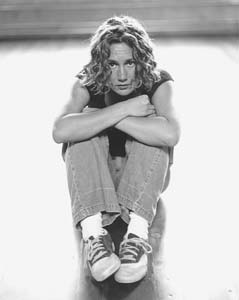![[MetroActive Music]](http://metroactive.com/music/gifs/music468.gif)
[ Music Index | San Francisco | MetroActive Central | Archives ]
Future Folk
 An Angel in the Outfield: Walker brings electro-fusion to folk on 'Lipsbury Pinfold.'
An Angel in the Outfield: Walker brings electro-fusion to folk on 'Lipsbury Pinfold.'
Introducing Karry Walker Singer/songwriter Karry Walker knew next to nothing about electronic music when she read an interview with Andrew Jervis and David Biegel of the local electronica outfit Bugs. What she did know was that traditional rock bands weren't speaking to her. Playing with them made her music sound "beige," she says, bland and anodyne, obscuring the wounded passion that makes her songs so rich. And she liked what the Bugs boys were saying about their openness to musicians who wanted to push the boundaries of their genre. So she sent them a demo tape, and the next day Jervis, who is also the vice president of the acclaimed local electronic label Ubiquity, called and said he wanted to work with her. The result of their fortuitous connection is Lipsbury Pinfold, a gorgeous album that combines Walker's roughly angelic voice, intensely introspective lyrics and minimalist guitar playing with crackling electronic ambiance. Reminiscent of Beth Orton's Trailer Park, Lipsbury Pinfold maintains its earthiness despite the loops and samples that swirl throughout it. Unlike that of so many self-consciously trip-pop bands that emerged after the successes of Orton and Portishead, the high-tech production on Walker's album is deployed subtly and artfully, creating an album that has both the ethereal gloss of ambient music and a raw emotion true to her folk roots. "I'm not even familiar with the terminology," Walker says of her foray into electronic music. "If I were to try and throw around those terms, I would just sound stupid. I don't pretend to know anything about that scene, but I liked what I was hearing coming out of it. If I like something I try to find out more about it and use it somehow. I don't pretend to know anything about the politics of the scene or the genre. I try not to anyway--when I'm at my best, I'm humbly trying to stay away from sounding arrogant and pompous." Actually, one of the most refreshing things about Walker's music is that it's musically sophisticated without being concerned with trendy knowingness. Especially on such stunning tracks as the melancholy "On the Roof" and the lugubrious "Sides of Her Feet," her voice veers between velvet and gravel, wrapping around certain words with a devastating clarion sweetness. There's a vulnerability in her voice that's never mawkish and a low-key lushness to the music that doesn't flaunt its complexity. Of course, the Lilith Fair has turned female earnestness into a blue-chip industry, and now tons of boys are leaping aboard the gravitas train, too--P.J. Olson and Jason Faulkner, with his condescendingly titled "Can You Still Feel?," jump immediately to mind. But the goose-bumpy sound that's so sought after is often elusive. Walker, though, has a voice to pierce even the toughest skin. She sounds girlish and tobacco roughened all at once, frank and tender and honest. Ani DiFranco has often said that one reason she considers herself a folk singer instead of a rock star is because folk isn't about coolness or glamour, and the same could be said of Walker. "I think of myself as a folk singer when I'm trying to get back to the reasons why I'm doing this, why I'm playing and why it's important to me," Walker says. "Other times, I don't like to think of myself as folk singer because of all the stigma that's associated with it. To me, folk is a really broad thing--any songwriter can be considered a folk musician. If you think folk means whatever the voice of the generation is saying at that time, a rap singer could be considered a folk singer." Which is precisely what makes Lipsbury Pinfold so special--the balance of the innovative and the universal. Sonically, its sparkling, undulating soundscapes situate it firmly in the present, decades away from the crunchy strumming that often makes traditional folk sound so tired. But the heartbreak and immediacy of the singing set the album outside of fads or momentary youth-culture fetishes, connecting Walker to folk artists of the past and suggesting that she'll still be relevant when most of the music that sounds futuristic today is pumping feebly out of post-millennial oldies stations. [ San Francisco | MetroActive Central | Archives ]
|
From the June 21, 1999 issue of the Metropolitan.
Copyright © Metro Publishing Inc. Maintained by Boulevards New Media.